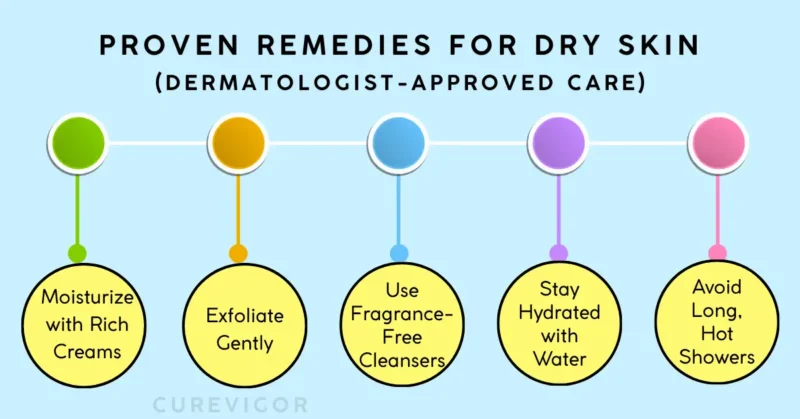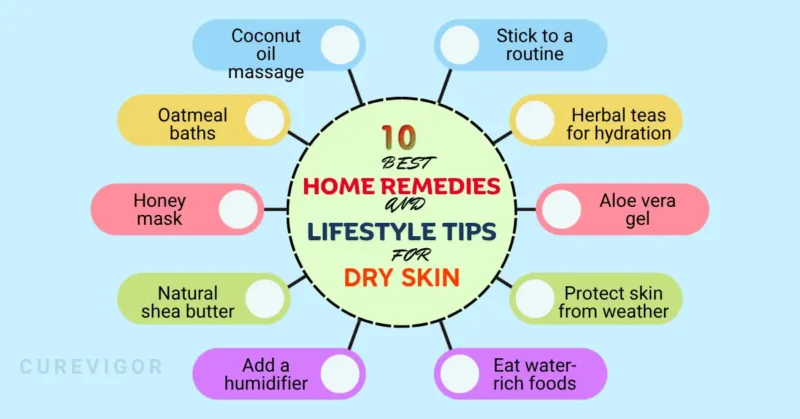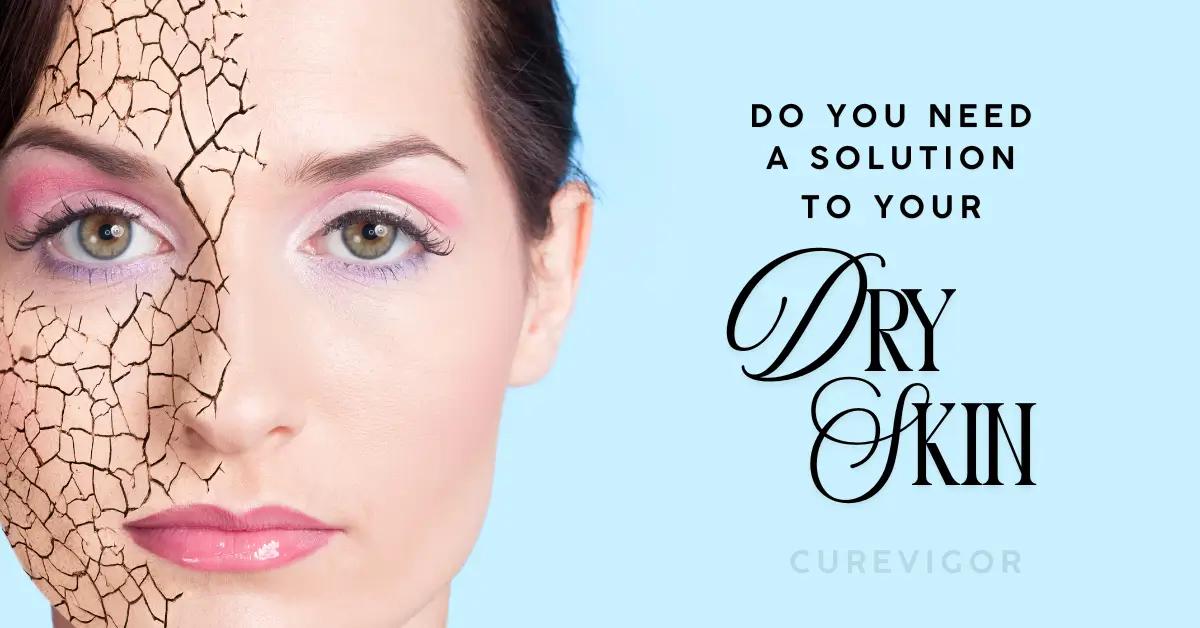Discover the best dry skin remedies, proven treatments, and natural solutions. Learn moisturizing tips and lifestyle hacks for soft, glowing skin.
Thank you for reading this post, don't forget to subscribe!Dry skin can feel uncomfortable, itchy, and sometimes even painful. Whether it shows up as rough patches, cracks, or tightness after washing, dry skin is more than just a cosmetic issue—it’s a signal that your skin needs care and protection. The good news is, you don’t have to struggle endlessly.
There can be a significant impact if you understand the causes, know the right treatments, and learn how to care for your skin every day. This guide offers practical tips, natural solutions, and expert-backed strategies to restore hydration, soothe irritation, and maintain your skin’s glow and health throughout the year.
How to Find Your Spiritual Home: Step-by-Step Inner Harmony Guide
Are you constantly battling tight, flaky, or itchy skin? If yes, you’re not alone. Dry skin, also known as xerosis, is one of the most common skincare concerns worldwide. From cold weather and harsh cleansers to dehydration and aging, countless triggers can strip your skin of its natural moisture. The result? Dullness, irritation, and discomfort make you feel less confident.
The good news is that dry skin remedies are plentiful—and many of them are proven to work. Whether you’re searching for quick solutions for dry skin, dermatologist-approved treatments, or soothing natural remedies for dry skin, there’s a practical option for you.
In this article, we’ll dive deep into the causes of dry skin, explore the most effective dry skin treatments, and reveal moisturizing tips that will help you restore soft, radiant, and healthy-looking skin.
Understanding Dry Skin: Causes and Symptoms
Dry skin isn’t just a cosmetic issue—it’s your body’s way of signaling that your skin barrier is struggling to hold onto essential moisture. When this barrier is disrupted, the skin loses water and natural oils, leading to irritation, discomfort, and in some cases, long-term damage. Knowing the causes and identifying the symptoms early is the first step toward selecting the most effective dry skin remedies.
Common Causes of Dry Skin

1. Environmental Factors
Your surroundings have a significant impact on your skin’s health.
- Cold Weather: Winter air has lower humidity, which can pull moisture from your skin, often leading to flaky patches and “winter itch.”
- Dry Indoor Air: Skin becomes tight and dry due to heating systems in homes and workplaces lowering air moisture levels.
- Sun Exposure: UV rays damage the skin’s barrier, reducing its ability to retain hydration and accelerating the aging process.
Tip: Using a humidifier indoors and applying broad-spectrum sunscreen daily are essential solutions for dry skin caused by environmental triggers.
2. Harsh Products
Every day, skincare choices can exacerbate dryness.
- Soaps and Cleansers: Conventional soaps can deplete the skin’s protective oils and often have an alkaline pH.
- Alcohol-Based Skincare: Toners, hand sanitizers, and products with high alcohol content can weaken the barrier.
- Fragrances and Dyes: These might aggravate dryness by irritating sensitive skin.
Tip: Switch to gentle cleansers and fragrance-free moisturizers for more effective treatment of dry skin.
3. Skin Conditions
Underlying medical conditions can turn occasional dryness into a chronic issue.
- Eczema (Atopic Dermatitis): Causes red, itchy, scaly patches that flare up with irritants.
- Psoriasis: Leads to thick, silvery scales and intense dryness.
- Allergens, such as detergents or skincare products, trigger contact dermatitis.
Tip: If dryness doesn’t improve with home care, consult a dermatologist to rule out skin conditions.
4. Aging Skin
As we age, our skin naturally loses its ability to stay hydrated.
- Oil production decreases, resulting in reduced natural moisture.
- The skin barrier becomes thinner and more fragile.
- Fine lines and wrinkles often appear more pronounced on dry skin.
Tip: Anti-aging products with ceramides, peptides, and hyaluronic acid provide targeted hydration for mature skin.
5. Lifestyle Habits
Daily routines can unintentionally worsen dryness.
- Hot Showers: Protective oils are removed by prolonged exposure to hot water.
- Dehydration: Not drinking enough water leads to dull, tight skin.
- Diet Choices: A deficiency in omega-3 fatty acids and antioxidants impairs the skin’s ability to retain moisture.
Tip: Adopt moisturizing habits, such as limiting shower time, drinking water regularly, and incorporating foods like salmon, walnuts, and avocados into your diet.
Recognizing Symptoms of Dry Skin
Catching the signs early helps prevent dry skin from progressing into cracks or infections.
- Flakiness and Rough Texture: The skin feels uneven, especially on arms, legs, and face.
- Tightness: Skin may feel stretched, particularly after washing.
- Redness and Irritation: Dry patches can become inflamed and itchy.
- Cracks and Peeling: Severe dryness can lead to painful fissures, which increase the risk of infection.
- Dull Appearance: A lack of moisture gives the skin a lifeless, tired appearance.
If your skin consistently shows multiple symptoms, it’s time to explore reliable dry skin remedies that target both the causes and signs for long-lasting relief.
Causes vs. Symptoms of Dry Skin
| Causes of Dry Skin | How It Affects the Skin | Visible Symptoms |
|---|---|---|
| Cold Weather & Low Humidity | Pulls moisture from the skin’s surface | Flakiness, rough patches, winter itch |
| Dry Indoor Air (Heating/AC) | Reduces hydration in the environment | Tightness, dull appearance |
| Harsh Soaps & Cleansers | Strips away protective oils | Redness, irritation, stinging after washing |
| Alcohol-Based Products | Weakens natural barrier | Burning sensation, dry patches |
| Prolonged Hot Showers | Washes away natural oils | Tightness, peeling, itchiness |
| Sun Exposure (UV Damage) | Breaks down collagen and lipids | Premature wrinkles, dryness, rough texture |
| Aging (Reduced Oil Production) | Thinner, less elastic skin | Fine lines, dullness, persistent dryness |
| Skin Conditions (Eczema, Psoriasis, Dermatitis) | Disrupts skin’s natural repair process | Itchy, scaly, inflamed patches |
| Dehydration (Lack of Water Intake) | Reduces elasticity and hydration | Dull, tired-looking skin, fine cracks |
| Poor Diet (Low in Omega-3 & Antioxidants) | Weakens skin’s natural barrier | Dryness, uneven tone, lack of glow |
How to Use This Table:
- Identify the cause of your dry skin.
- Match it with the visible symptoms you’re experiencing.
- Apply the right solution (like moisturizers, natural remedies, or lifestyle changes) to address both the root and the effects.
Proven Remedies for Dry Skin (Dermatologist-Approved Care)

Moisturize with Rich Creams
A good moisturizer is the number one solution for dry skin. Choose a thick, rich cream or ointment instead of a light lotion. To help your skin retain water, look for substances like shea butter, glycerin, or hyaluronic acid.
Always apply moisturizer right after a shower or bath, when your skin is still slightly damp, to lock in maximum hydration.
Exfoliate Gently
Dry skin often builds up dead cells on the surface, making it feel rough and flaky. Once or twice a week, gentle buffing can help soften the texture and enhance the absorption of moisturizers. Use a mild scrub or a soft washcloth—avoid harsh scrubbing, as this can damage your skin’s barrier. Remember, gentleness is the key.
Use Fragrance-Free Cleansers
Many soaps and body washes contain strong chemicals or perfumes that strip your skin’s natural oils. Switch to fragrance-free, sulfate-free cleansers that are gentle but still effective. These help clean your skin without causing tightness or irritation. A creamy or oil-based cleanser is usually the best choice for dry skin.
Stay Hydrated with Water
Hydration doesn’t only come from moisturizers; it also comes from within. Drinking enough water daily helps keep your skin cells plump and healthy. Instead of drinking water all at once, try to do so throughout the day in small amounts.
Hydration is enhanced when you combine it with foods that are high in water content, such as watermelon, cucumbers, and oranges.
Avoid Long, Hot Showers
It’s tempting to enjoy a hot, steamy shower, but too much heat strips away the natural oils that keep your skin soft. Use lukewarm water and keep your showers to no more than five to ten minutes. Use a fluffy towel to gently dry your skin after taking a bath, and then apply moisturizer immediately. This simple change can dramatically improve dry skin.
Natural Remedies for Dry Skin
Nature provides powerful ingredients that can soothe, heal, and restore balance to your skin. Unlike synthetic formulas, these remedies are gentle, nutrient-rich, and often come with additional benefits beyond hydration. The following are some of the best natural treatments to incorporate into your regular skincare routine.
Coconut Oil: Deep Hydration and Barrier Repair
Coconut oil is one of the most widely trusted natural remedies for dry skin, as it works in two ways: it both hydrates and protects. Its fatty acids mimic the skin’s natural oils, filling in gaps in the barrier that cause moisture loss.
- How to Use: After a shower, when your skin is still slightly wet, rub a tiny amount of warmed virgin coconut oil between your palms. Apply a small layer before bed to dry areas, such as your hands, elbows, and feet, for overnight restoration.
- Extra Benefit: Coconut oil also possesses antibacterial properties, making it an ideal choice for preventing skin infections caused by cracks or dryness.
Shea Butter: Vitamin-Rich Nourishment
The term “nature’s conditioner” for the skin is frequently used to describe shea butter. It’s rich in vitamins A and E, along with essential fatty acids that deeply penetrate and soften even the driest patches.
- How to Use: Apply unrefined shea butter as a body butter or spot treatment on problem areas. It works exceptionally well as a hand cream in winter or as a protective balm for chapped lips.
- Extra Benefit: Shea butter is an excellent option for individuals with eczema or sensitive skin, as it helps alleviate irritation.
Oatmeal: Soothing Relief for Irritation
Colloidal oatmeal isn’t just for breakfast—it’s a skin savior. It forms a barrier on the skin that reduces redness and irritation while maintaining moisture.
- How to Use: Add a cup of finely ground oatmeal to lukewarm bath water for a soothing soak. Alternatively, look for lotions and creams that feature colloidal oatmeal as the primary ingredient.
- Extra Benefit: Its antioxidant compounds, called avenanthramides, help reduce itching and flare-ups from conditions like psoriasis and eczema.
Honey: Nature’s Humectant and Healer
Honey is a natural humectant, meaning it draws water into the skin and retains it there. Its thick texture also makes it a great quick fix for flaky, rough patches.
- How to Use: Apply a thin layer of raw honey as a hydrating face mask for 15–20 minutes, then rinse with lukewarm water. For an incredibly moisturizing DIY treatment, combine honey with a few drops of olive oil.
- Extra Benefit: Honey’s natural enzymes and antioxidants not only hydrate but also promote wound healing and improve skin texture over time.
Pro Tip: Rotate these natural remedies according to the season and your skin’s specific needs. For instance, use coconut oil in winter for deep hydration, oatmeal in summer to calm sun irritation, and honey year-round for an instant glow.
Proven Remedies vs. Natural Remedies vs. Lifestyle Tips for Dry Skin
| Category | Best Options | How They Work | Who Should Try Them |
|---|---|---|---|
| Proven Remedies | – Moisturizers with hyaluronic acid, ceramides, glycerin – Gentle exfoliants (lactic acid, glycolic acid) – pH-balanced cleansers | Restore hydration, repair skin barrier, remove dead cells, prevent water loss | Anyone with persistent dryness or looking for dermatologist-approved dry skin treatment |
| Natural Remedies | – Coconut oil – Shea butter – Oatmeal – Honey | Nourish with natural fatty acids, soothe irritation, reduce inflammation, lock in moisture | Great for those preferring natural remedies for dry skin or with sensitive skin |
| Lifestyle Tips | – Staying hydrated – Limiting hot showers – Using humidifiers – Eating omega-3 rich foods (salmon, walnuts, flaxseeds) | Support skin health from the inside out, prevent future dryness, protect natural oils | Ideal for long-term management and preventing recurring dry skin symptoms |
Quick Takeaway:
- Proven remedies work fastest for relief.
- Natural remedies are gentle, nourishing, and safe for sensitive skin.
- Lifestyle tips ensure results last by protecting your skin daily.
Best 10 Home Remedies and Lifestyle Tips for Dry Skin

These are practical, gentle, and easy-to-implement remedies and habits you can use at home to complement clinical care and maintain soft, healthy skin daily.
Coconut or Almond Oil Massage
Before going to bed, gently massage a small amount of sweet almond or virgin coconut oil into your moist skin between your arms. These oils supply nourishing fatty acids and help replenish the lipid layer while you sleep. Use on hands, elbows, feet, and body; avoid heavy facial use if you are prone to acne. Patch-test first to ensure no sensitivity.
Unrefined Shea Butter for Targeted Repair
Shea butter is rich in vitamins and long-chain fatty acids that soothe and restore. Apply a thin layer to problem zones (heels, knees, cuticles) after moisturizing to boost overnight repair. It’s beneficial in cold months when the barrier needs extra protection.
Colloidal Oatmeal Baths to Calm and Hydrate
Add finely ground colloidal oatmeal to a lukewarm bath for 10–15 minutes to relieve itch and form a protective moisture barrier. Oatmeal contains soothing compounds that help reduce redness and irritation, making it an ideal choice for managing flare-ups and sensitive skin. Pat dry and seal with a thick moisturizer immediately.
Raw Honey Mask for Humectant Action
Use raw, unpasteurized honey as a short mask (10–20 minutes) to draw moisture into the skin and promote gentle he ling. Honey can help mend small cracks because it is a natural humectant and has moderate antimicrobial qualities. Rinse with lukewarm water, then apply moisturizer.
Aloe Vera Gel for Instant Cooling Relief
Pure aloe vera gel provides quick, soothing hydration after sun or wind exposure. Apply a thin layer to irritated patches to reduce stinging and support the recovery of your skin’s barrier. Choose products with minimal additives or extract fresh gel from the leaf when possible.
Use a Humidifier Indoors
Running a humidifier, especially in bedrooms during dry months, raises ambient moisture and reduces overnight transepidermal water loss. Aim for comfortable humidity levels (about 40 50%). This small habit significantly reduces flaking and improves skin comfort on waking.
Diet and Hydration: Eat and Drink for Your Skin
Increase intake of water-rich foods (such as cucumber, citrus, and watermelon) and dietary omega-3 sources (like salmon, flaxseeds, and walnuts). These nutrients support cell membrane health and skin elasticity from the inside. Drink consistently through the day rather than relying on large amounts at once.
Short, Lukewarm Showers and Gentle Drying
Swap hot, long showers for lukewarm, 5–10 minute rinses. After washing, gently pat the skin with a towel and immediately apply moisturizer to trap any residual moisture. This small change preserves natural oils and is one of the simplest, most effective moisturizing tips.
Protective Clothing and Barrier Care
Wear gloves in cold wind or when washing dishes to prevent barrier stripping. For hands, apply a thick emollient before bed and cover with cotton gloves for intensive overnight repair. Sunscreen and wide-brim hats protect facial skin from UV-driven dryness and aging.
Consistency and Patch Testing When Trying New Remedies
Stick to a simple, consistent routine and introduce new home remedies one at a time to determine which ones are most effective. Allow any new measure at least 2–4 weeks to demonstrate its benefits, and always patch-test to prevent irritation. Consistency turns small home remedies into reliable, long-term solutions for dry skin.
Complete Dry Skin Care Routine (Morning vs. Night)
A consistent routine is the secret to managing stress. Here’s a step-by-step guide:
Morning Routine for Dry Skin
- Cleanse Gently: Use a sulfate-free, hydrating cleanser to gently wash away impurities without stripping your skin’s natural oils.
- Tone Smartly: Apply an alcohol-free toner with rose water or aloe vera for a refreshing moisture boost.
- Hydrate: Apply a lightweight serum containing hyaluronic acid to plump and lock in moisture.
- Moisturize: Use a cream rich in ceramides or shea butter to strengthen the skin barrier.
- Protect: Always finish with sunscreen (SPF 30+), even on cloudy days, to prevent UV-induced dryness.
Night Routine for Dry Skin
- Double Cleanse: Use a cleanser formulated with oil to gently remove debris and makeup, followed by a gentle cream cleanser.
- Do this twice a week: Remove dead skin cells and improve absorption by using a little lactic acid exfoliator.
- Target Repair: Apply a nourishing facial oil (like jojoba or almond oil) or a serum with niacinamide.
- Seal with Moisture: Use a thicker night cream or ointment to lock in hydration overnight.
- Overnight Care: Apply a thin layer of coconut oil or petroleum jelly to extra-dry areas (such as heels, elbows, and hands) before bedtime.
Tip: Invest in a bedside humidifier to add moisture to the air while you sleep—your skin will thank you in the morning.
FAQs
Q. Why does dry skin occur?
When your skin loses too much water or oil, it becomes dry. Cold weather, hot showers, strong soaps, and even some medical issues are typical reasons. Environmental factors such as wind exposure and low humidity are also crucial.
Aging naturally reduces oil production, making dryness more likely. Once you identify what triggers your dry skin, you can take steps to address it and prevent future flare-ups.
Q. How can I treat dry skin at home?
You can treat dry skin at home with simple yet effective remedies. Using fragrance-free moisturizers, applying natural oils like coconut or almond oil, and avoiding long hot showers can help.
Drinking enough water also supports hydration from within. Gentle exfoliation, done once a week, reduces dead cells, allowing your skin to utilize moisture more effectively. Consistency is key—daily care ensures long-lasting results.
Q. Is dry skin a sign of a health problem?
Most of the time, dry skin is temporary and linked to environmental factors. However, if your dryness is severe, persistent, or accompanied by redness and cracks, it may point to conditions like eczema, psoriasis, or thyroid issues. In such cases, it’s best to consult a dermatologist.
Regular self-care is essential, but professional guidance ensures you get the proper treatment when dryness is more than skin-deep.
Q. Which ingredients should I look for in moisturizers?
For dry skin, look for moisturizers with hydrating and barrier-repairing ingredients. Ceramides fortify your skin’s natural barrier, while hyaluronic acid draws and retains moisture. Shea butter and glycerin provide lasting softness, while aloe vera soothes irritated skin.
Products that contain alcohol or strong scents should be avoided, as they may deplete natural oils and exacerbate dryness. A good moisturizer should feel nourishing, not greasy or irritating.
Q. How can I prevent dry skin in winter?
Winter is especially harsh on the skin due to cold air and indoor he ting. To prevent dryness, use a humidifier to add moisture to your home environment. Switch to a richer moisturizer, wear gloves when outdoors, and avoid washing your face or hands with hot water.
Adding omega-3-rich foods, such as fish, nuts, and seeds, to your diet can also support skin hydration. Minor adjustments go a long way in keeping your skin soft during the colder months.
Bottom Line: Dry Skin Solutions That Deliver
- Identify the cause – Environmental factors, aging, harsh products, and dehydration are the primary triggers of dryness.
- Watch for symptoms – Flakiness, tightness, redness, and dullness signal that your skin needs care.
- Use proven remedies – Moisturizers, gentle exfoliants, and barrier-repair creams provide quick relief.
- Try natural remedies – Coconut oil, oatmeal, shea butter, and honey offer safe and adequate hydration.
- Adopt lifestyle tips – hydrate, eat omega-3-rich foods, use a humidifier, and limit hot showers.
- Follow a routine – A consistent morning and night skincare regimen ensures long-term results.
With the right combination of dry skin treatments, natural remedies, and lifestyle changes, you can finally say goodbye to rough, itchy skin and hello to a glowing, nourished complexion all year round.
Get more health & beauty tips.
You might love:

